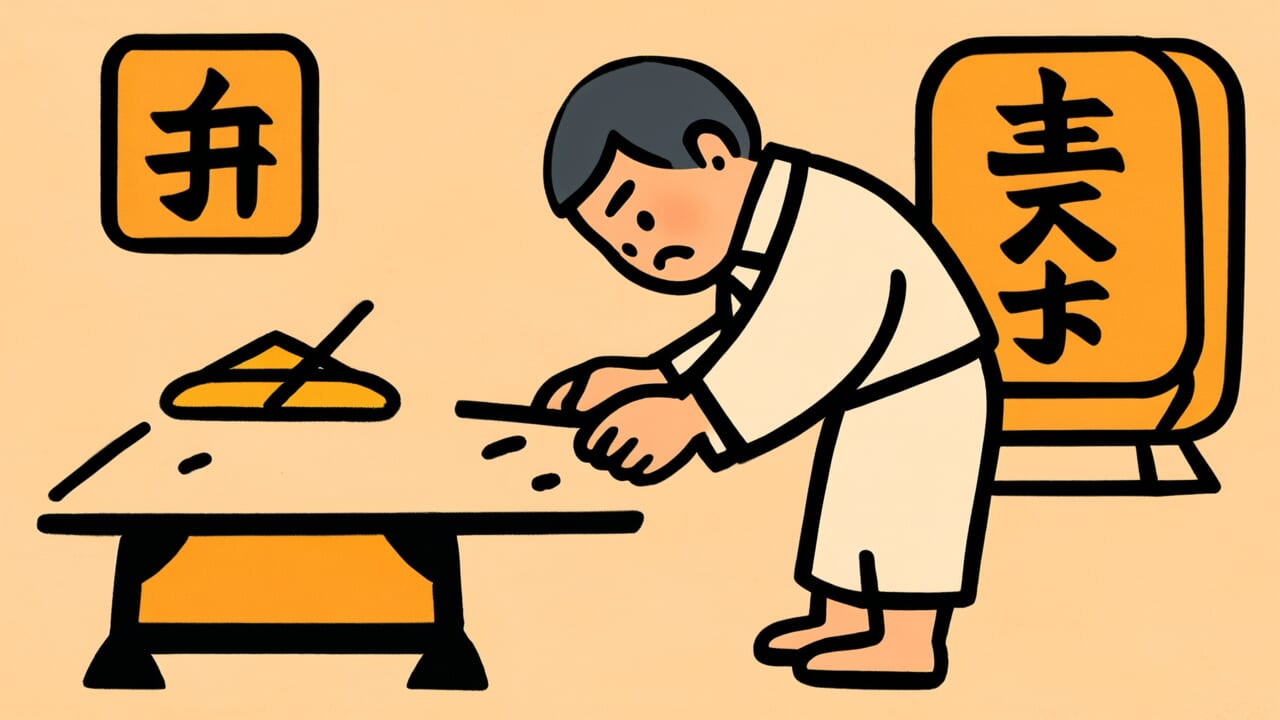How to Read “The character ‘nin’ in patience is worth a hundred kan”
かんにんのにんのじがひゃっかんする
Meaning of “The character ‘nin’ in patience is worth a hundred kan”
This proverb means that patience has tremendous value. It expresses that even just the single character “nin” (忍) in the word “kannin” (patience) is worth as much as a hundred kan, an enormous weight.
In human relationships, holding back anger and enduring frustration is not easy. If you let your emotions explode in the moment, you might destroy relationships or lose trust.
On the other hand, if you endure patiently, relationships are preserved. This often brings great benefits and peace later on.
This proverb is used to emphasize the value of patience. People recall these words when they’re about to be swept away by immediate emotions, or when they need to think from a long-term perspective.
Even today, this teaching carries unchanging weight in human relationships at work and at home.
Origin and Etymology
No clear written records remain about the origin of this proverb. However, we can make interesting observations from how the words are constructed.
First, “kannin” means to suppress anger or dissatisfaction and endure. The character “nin” (忍) shows a blade above a heart in its structure.
This represents enduring pain as if a blade were pressed against your heart.
“Hyakkan” (hundred kan) is a unit of weight. One kan equals about 3.75 kilograms, so a hundred kan is roughly 375 kilograms. For common people in the Edo period, this was an unimaginable weight.
A single rice bale holding four to (a traditional measure) weighed about 60 kilograms. A hundred kan was more than six times that. It truly expressed immeasurable value.
This proverb’s structure says that even just the character “nin” in kannin is worth a hundred kan. In other words, it expressed the value of patience using a concrete unit of weight that people of that time could truly feel.
The saying likely spread among Edo period merchants and craftsmen as wisdom for smooth human relations. The teaching that losing your temper causes loss, and that patience has great value, is packed into this memorable expression.
Usage Examples
- I was angry then, but the character ‘nin’ in patience is worth a hundred kan, so staying quiet was the right choice
- The character ‘nin’ in patience is worth a hundred kan, so let’s endure and watch how things develop
Universal Wisdom
Humans have emotions. Anger, frustration, dissatisfaction. These are natural reactions that everyone experiences.
However, this proverb has been passed down for hundreds of years because our ancestors deeply understood the danger of acting purely on emotion.
What’s interesting is that this proverb isn’t a moral command saying “you should be patient.” Instead, it’s a statement of fact: “patience has value.”
By expressing this with the concrete weight of a hundred kan, it shows that endurance isn’t just a virtue. It has practical value.
Human society is built on a web of relationships. If you cut the threads in a moment of emotion, repairing them requires immeasurable effort.
Conversely, if you can suppress anger in the moment, relationships are preserved. Trust deepens, and eventually brings great rewards.
This proverb teaches both human weakness and strength. We are weak beings easily controlled by emotions. But we also have the strength to control them through reason.
Our ancestors saw that exercising that strength has immeasurable value.
When AI Hears This
In materials engineering, when force is applied to an object, a phenomenon called “stress concentration” occurs. The force doesn’t distribute evenly but concentrates in specific places.
For example, if a metal plate has a small scratch, force gathers there. It breaks with much less force than its original strength would suggest.
The human heart is similar. When receiving external forces like anger or dissatisfaction, the act of enduring accumulates stress inside the heart.
What’s interesting is the specific numerical value of “a hundred kan.” Materials always have a “yield point,” a limit value. Beyond it, irreversible deformation begins.
This proverb empirically shows that endurance has quantifiable limits. A hundred kan is a weight far exceeding what humans can lift. It symbolically expresses the upper limit of stress that the material called “heart” can withstand.
Furthermore, materials engineering has a phenomenon called “fatigue failure” from repeated loads. Even small forces, applied repeatedly, cause sudden breakage one day.
The danger of repeated endurance is exactly this fatigue failure mechanism. The accumulation of small dissatisfactions causes more unpredictable collapse than one large anger.
This proverb is a remarkable insight that treats emotion as an engineering problem of durability.
Lessons for Today
Modern society is an age that values immediacy. On social media, instant reactions are demanded. Messages are expected to receive quick replies.
But this is exactly why this proverb’s teaching becomes important.
When you get angry at someone, try taking a breath before reacting immediately. Weigh what you’ll gain by venting that anger against what you’ll lose.
In most cases, you’ll realize you’ll lose more.
Patience is not weakness. It’s proof of the strength to control your emotions. By exercising that strength, you can build great wealth in human relationships.
Trust, respect, stable relationships. These cannot be obtained overnight. They’re nurtured through the accumulation of small daily acts of patience.
Of course, you don’t need to endure everything. But before reacting on emotion, remember these words.
That one moment of endurance might bring a hundred kan worth of value to your life.



Comments